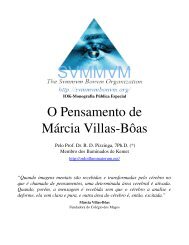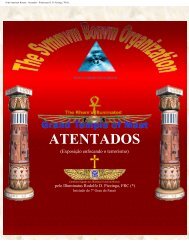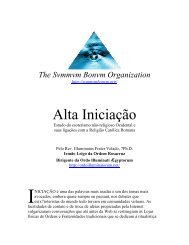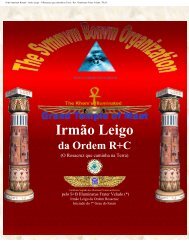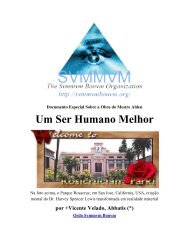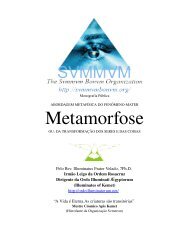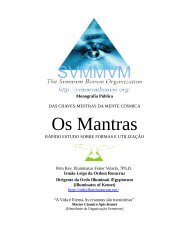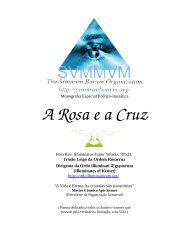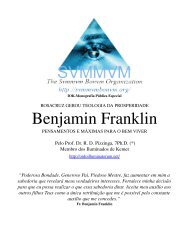History Of The Rose-Croix Sedir - Ordo Svmmvm Bonvm
History Of The Rose-Croix Sedir - Ordo Svmmvm Bonvm
History Of The Rose-Croix Sedir - Ordo Svmmvm Bonvm
You also want an ePaper? Increase the reach of your titles
YUMPU automatically turns print PDFs into web optimized ePapers that Google loves.
the only Book of Life ". Florentinus of Valentia take then the first nobody; it says: " We listen<br />
to the Word in spirit in a quiet Sabbath " the book which contains all the others is in you, and<br />
in all the men " It is him which leads to the wisdom, which guides the wise ones, which made<br />
known of all to me, of creation, of times, stars, the animals, the thoughts, the men, the plants<br />
" the kingdom of God is in you (Luc XVII, 21). " the Word is the wisdom of God, his image,<br />
his spirit, its law, Christ in the man " Just as the small finger put in front of the eye prevents<br />
from seeing a whole city, in the same way a small defect prevents from seeing the treasure<br />
of Regeneration... " Adam does not have chu that by his own will. " I want nothing to be and<br />
ouïr all, to give up itself with God like a child, to adapt my will to his, to seek it above all, to<br />
let act its kingdom in me " (36). *** Irenaeus Agnostus appears to be the pseudonym of<br />
Gotthardus Arthusius, of Dantzig, which was a vice-rector of the Gymnasium of Francfort-surle-Main<br />
and which Semler believes to have been a chancellor of Westphalia. II sign one of<br />
its books (24) " makes indignant it notary of Fraternity for Germanie ". In Fons Gratiae (37) it<br />
takes again the lesson of Fama: " To fight against the defects and the defects, to live in<br />
humility, justice, the truth, chastity, like the first brothers. After the preparation, which will be<br />
able to last five years, the man, having carried the cross, will know the pink ". This " peaceful<br />
Inconnu " is a character enigmatic. <strong>The</strong> works published under its name are apologies for the<br />
Rosicrucian brotherhood (3). However, one of the opuscules signed of him (4) is caught<br />
some violently with the work also published under its name which is mentioned here (note<br />
3). Certain authors, Buhle, Waite, assimilated, but without evidence, Irenaeus Agnostus<br />
with one of the adversaries of the Rosicrucian brotherhood, like F.-G. Menapius. ***<br />
Another anonymity signs Rhodophilus Staurophorus (the friend of the pink carrying the<br />
cross). A. Peeters-Baertsoen identifies it without evidence with Irenaeus Agnostus.<br />
Rhodophilus Staurophorus is the author of a booklet of 15 pages, written in August 1618:<br />
<strong>The</strong> philosophical Abduction (38). It signs " makes indignant it servant of the Fraternity of the<br />
Rosicrucian brotherhood ". *** still Let us quote Julianus de Campis, author of the Letter<br />
dated from Belbosco April 24 1615 (39) which was published with Fama in the edition of<br />
1616 and in that from 1617. Kazauer (8) claims that it is about Julius Sperber, adviser of<br />
Anhalt-Dessau, author of the Echo of Fraternity Rosicrucian brotherhood (40). *** One of<br />
most erudite among the writers rosicrucians is the author of the restored Golden age (41),<br />
Henri Madathanus (Adrian Mynsicht). Originating in Brunswick, it is entitled Frère of the Gold<br />
Cross. He was a doctor and surgeon of the duke Adolphe Frederic de Mecklembourg. He<br />
worked with his famulus, Hermann Datich, to link the work of Boehme and that of the<br />
hermetists (5). *** the French philosopher Michel Potier, who lived in Germany, was filled<br />
with enthusiasm for the Rosicrucian brotherhood. II dedicated to the Brothers his New<br />
Treaty of the philosopher Pierre (42) and his Philosophy pure (43), informant that, in front of<br />
them, it is ignorant. II invites them to preach their doctrines in his country *** Into 1622, one<br />
found placarded with the walls of the principal crossroads of Paris a poster thus made out: "<br />
Us, Deputez of the principal College of the Brothers of the Roze-Cross, let us make<br />
visible and invisible stay in ceste city, by the grace Very High to which turns the heart of<br />
right. We will monstrons and teach without lashings ny marks with speaking all kinds of<br />
languages about the païs where want estre, to draw the men our similar from error and of<br />
dead " A few days later a new poster was affixed. One read there: **time-out** " If it take<br />
enuie with somebody to we see by curiosity only, it communicate never auec we but, if the<br />
will it carry really and in fact to himself register on the register of nostre confraternité, we,<br />
which judge the thought, luy make see the verité of our promise, so much that we put not<br />
the place of nostre remain, since the thought, iointes with will reelle of reader, be able to we<br />
make cognoistre with luy and luy with we " Buhle, which take these poster for a pasquinade,<br />
suspect not how much they reveal the true nature and the capacity of follower. <strong>The</strong> invisible<br />
presence, interior teaching, the gift of the languages, the ability to make perceive the light<br />
with the right intelligences are the privileges of a very high initiation *** Gabriel Naudé,<br />
publicity agent, intimate secretary of the Mazarin cardinal, wrote an Instruction in France on<br />
the truth of the history of the Brothers of Roze <strong>Croix</strong>, Paris, 1623, where it claims to tell what<br />
it could know about the origins of " Fraternity "; it exposes the legend of Christian






